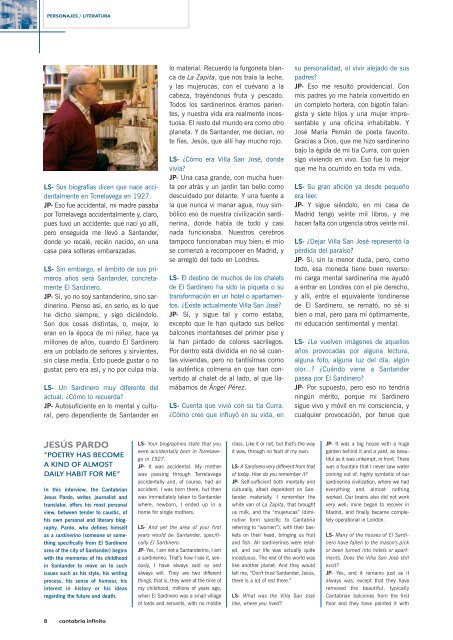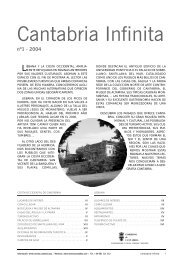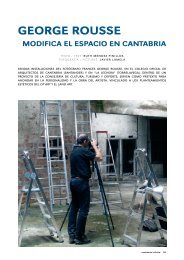Jesús Pardo Jesús Pardo - Cultura de Cantabria
Jesús Pardo Jesús Pardo - Cultura de Cantabria
Jesús Pardo Jesús Pardo - Cultura de Cantabria
You also want an ePaper? Increase the reach of your titles
YUMPU automatically turns print PDFs into web optimized ePapers that Google loves.
PERSONAJES / LITERATURA<br />
LS- Sus biografías dicen que nace acci<strong>de</strong>ntalmente<br />
en Torrelavega en 1927.<br />
JP- Eso fue acci<strong>de</strong>ntal, mi madre pasaba<br />
por Torrelavega acci<strong>de</strong>ntalmente y, claro,<br />
pues tuvo un acci<strong>de</strong>nte: que nací yo allí,<br />
pero enseguida me llevó a Santan<strong>de</strong>r,<br />
don<strong>de</strong> yo recalé, recién nacido, en una<br />
casa para solteras embarazadas.<br />
LS- Sin embargo, el ámbito <strong>de</strong> sus primeros<br />
años será Santan<strong>de</strong>r, concretamente<br />
El Sardinero.<br />
JP- Sí, yo no soy santan<strong>de</strong>rino, sino sardinerino.<br />
Pienso así, en serio, es lo que<br />
he dicho siempre, y sigo diciéndolo.<br />
Son dos cosas distintas, o, mejor, lo<br />
eran en la época <strong>de</strong> mi niñez, hace ya<br />
millones <strong>de</strong> años, cuando El Sardinero<br />
era un poblado <strong>de</strong> señores y sirvientes,<br />
sin clase media. Esto pue<strong>de</strong> gustar o no<br />
gustar, pero era así, y no por culpa mía.<br />
LS- Un Sardinero muy diferente <strong>de</strong>l<br />
actual. ¿Cómo lo recuerda?<br />
JP- Autosuficiente en lo mental y cultural,<br />
pero <strong>de</strong>pendiente <strong>de</strong> Santan<strong>de</strong>r en<br />
JESÚS PARDO<br />
“POETRY HAS BECOME<br />
A KIND OF ALMOST<br />
DAILY HABIT FOR ME”<br />
In this interview, the <strong>Cantabria</strong>n<br />
Jesus <strong>Pardo</strong>, writer, journalist and<br />
translator, offers his most personal<br />
view, between ten<strong>de</strong>r to caustic, of<br />
his own personal and literary biography.<br />
<strong>Pardo</strong>, who <strong>de</strong>fines himself<br />
as a sardinerino (someone or something<br />
specifically from El Sardinero<br />
area of the city of Santan<strong>de</strong>r) begins<br />
with the memories of his childhood<br />
in Santan<strong>de</strong>r to move on to such<br />
issues such as his style, his writing<br />
process, his sense of humour, his<br />
interest in history or his i<strong>de</strong>as<br />
regarding the future and <strong>de</strong>ath.<br />
8 cantabria infinita<br />
lo material. Recuerdo la furgoneta blanca<br />
<strong>de</strong> La Zapita, que nos traía la leche,<br />
y las mujerucas, con el cuévano a la<br />
cabeza, trayéndonos fruta y pescado.<br />
Todos los sardinerinos éramos parientes,<br />
y nuestra vida era realmente incestuosa.<br />
El resto <strong>de</strong>l mundo era como otro<br />
planeta. Y <strong>de</strong> Santan<strong>de</strong>r, me <strong>de</strong>cían, no<br />
te fíes, <strong>Jesús</strong>, que allí hay mucho rojo.<br />
LS- ¿Cómo era Villa San José, don<strong>de</strong><br />
vivía?<br />
JP- Una casa gran<strong>de</strong>, con mucha huerta<br />
por atrás y un jardín tan bello como<br />
<strong>de</strong>scuidado por <strong>de</strong>lante. Y una fuente a<br />
la que nunca vi manar agua, muy simbólico<br />
eso <strong>de</strong> nuestra civilización sardinerina,<br />
don<strong>de</strong> había <strong>de</strong> todo y casi<br />
nada funcionaba. Nuestros cerebros<br />
tampoco funcionaban muy bien; el mío<br />
se comenzó a recomponer en Madrid, y<br />
se arregló <strong>de</strong>l todo en Londres.<br />
LS- El <strong>de</strong>stino <strong>de</strong> muchos <strong>de</strong> los chalets<br />
<strong>de</strong> El Sardinero ha sido la piqueta o su<br />
transformación en un hotel o apartamentos.<br />
¿Existe actualmente Villa San José?<br />
JP- Sí, y sigue tal y como estaba,<br />
excepto que le han quitado sus bellos<br />
balcones montañeses <strong>de</strong>l primer piso y<br />
la han pintado <strong>de</strong> colores sacrílegos.<br />
Por <strong>de</strong>ntro está dividida en no sé cuantas<br />
viviendas, pero no tantísimas como<br />
la auténtica colmena en que han convertido<br />
al chalet <strong>de</strong> al lado, al que llamábamos<br />
<strong>de</strong> Ángel Pérez.<br />
LS- Cuenta que vivió con su tía Curra.<br />
¿Cómo cree que influyó en su vida, en<br />
LS- Your biographies state that you<br />
were acci<strong>de</strong>ntally born in Torrelavega<br />
in 1927.<br />
JP- It was acci<strong>de</strong>ntal. My mother<br />
was passing through Torrelavega<br />
acci<strong>de</strong>ntally and, of course, had an<br />
acci<strong>de</strong>nt: I was born there, but then<br />
was immediately taken to Santan<strong>de</strong>r<br />
where, newborn, I en<strong>de</strong>d up in a<br />
home for single mothers.<br />
LS- And yet the area of your first<br />
years would be Santan<strong>de</strong>r, specifically<br />
El Sardinero.<br />
JP- Yes, I am not a Santan<strong>de</strong>rino, I am<br />
a sardinerino. That’s how I see it, seriously,<br />
I have always said so and<br />
always will. They are two different<br />
things, that is, they were at the time of<br />
my childhood, millions of years ago,<br />
when El Sardinero was a small village<br />
of lords and servants, with no middle<br />
class. Like it or not, but that’s the way<br />
it was, through no fault of my own.<br />
LS- A Sardinero very different from that<br />
of today. How do you remember it?<br />
JP- Self-sufficient both mentally and<br />
culturally, albeit <strong>de</strong>pen<strong>de</strong>nt on Santan<strong>de</strong>r<br />
materially. I remember the<br />
white van of La Zapita, that brought<br />
us milk, and the “mujerucas” (diminutive<br />
form specific to <strong>Cantabria</strong><br />
referring to “women”), with their baskets<br />
on their head, bringing us fruit<br />
and fish. All sardinerinos were related,<br />
and our life was actually quite<br />
incestuous. The rest of the world was<br />
like another planet. And they would<br />
tell me, “Don't trust Santan<strong>de</strong>r, <strong>Jesús</strong>,<br />
there is a lot of red there.”<br />
LS- What was the Villa San José<br />
like, where you lived?<br />
su personalidad, el vivir alejado <strong>de</strong> sus<br />
padres?<br />
JP- Eso me resultó provi<strong>de</strong>ncial. Con<br />
mis padres yo me habría convertido en<br />
un completo hortera, con bigotín falangista<br />
y siete hijos y una mujer impresentable<br />
y una oficina inhabitable. Y<br />
José María Pemán <strong>de</strong> poeta favorito.<br />
Gracias a Dios, que me hizo sardinerino<br />
bajo la égida <strong>de</strong> mi tía Curra, con quien<br />
sigo viviendo en vivo. Eso fue lo mejor<br />
que me ha ocurrido en toda mi vida.<br />
LS- Su gran afición ya <strong>de</strong>s<strong>de</strong> pequeño<br />
era leer.<br />
JP- Y sigue siéndolo, en mi casa <strong>de</strong><br />
Madrid tengo veinte mil libros, y me<br />
hacen falta con urgencia otros veinte mil.<br />
LS- ¿Dejar Villa San José representó la<br />
pérdida <strong>de</strong>l paraíso?<br />
JP- Sí, sin la menor duda, pero, como<br />
todo, esa moneda tiene buen reverso:<br />
mi carga mental sardinerina me ayudó<br />
a entrar en Londres con el pie <strong>de</strong>recho,<br />
y allí, entre el equivalente londinense<br />
<strong>de</strong> El Sardinero, se remató, no sé si<br />
bien o mal, pero para mí óptimamente,<br />
mi educación sentimental y mental.<br />
LS- ¿Le vuelven imágenes <strong>de</strong> aquellos<br />
años provocadas por alguna lectura,<br />
alguna foto, alguna luz <strong>de</strong>l día, algún<br />
olor...? ¿Cuándo viene a Santan<strong>de</strong>r<br />
pasea por El Sardinero?<br />
JP- Por supuesto, pero eso no tendría<br />
ningún mérito, porque mi Sardinero<br />
sigue vivo y móvil en mi consciencia, y<br />
cualquier provocación, por tenue que<br />
JP- It was a big house with a huge<br />
gar<strong>de</strong>n behind it and a yard, as beautiful<br />
as it was unkempt, in front. There<br />
was a fountain that I never saw water<br />
coming out of, highly symbolic of our<br />
sardinerina civilization, where we had<br />
everything and almost nothing<br />
worked. Our brains also did not work<br />
very well; mine began to recover in<br />
Madrid, and finally became completely<br />
operational in London.<br />
LS- Many of the houses of El Sardinero<br />
have fallen to the mason's pick<br />
or been turned into hotels or apartments.<br />
Does the Villa San José still<br />
exist?<br />
JP- Yes, and it remains just as it<br />
always was, except that they have<br />
removed the beautiful, typically<br />
<strong>Cantabria</strong>n balconies from the first<br />
floor and they have painted it with




